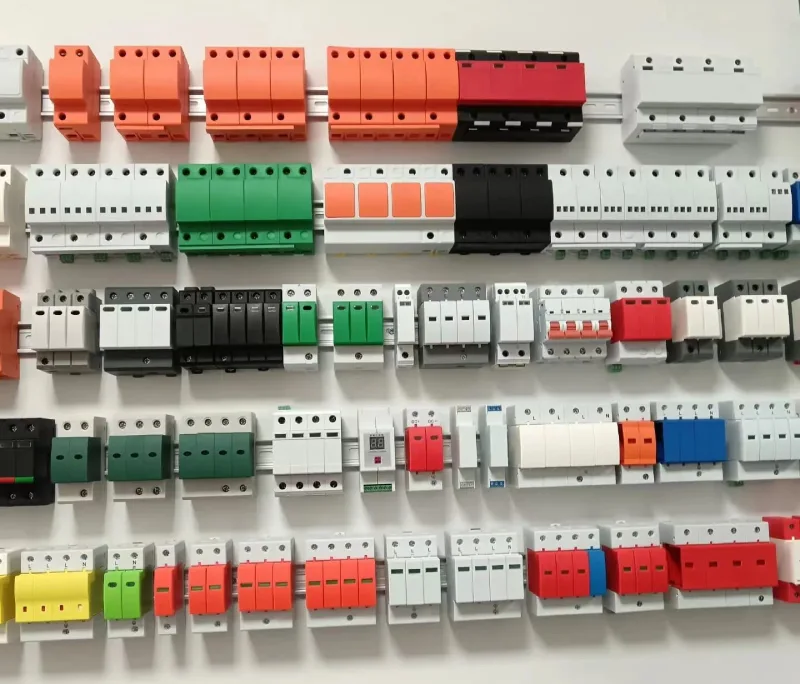Choosing the right surge protection device (SPD) configuration is critical for protecting electrical systems from voltage surges and lightning strikes. The four main types—1P, 1+NPE, 3P, and 3+NPE—each serve specific applications based on your electrical system configuration and protection requirements.
Kas ir pārsprieguma aizsardzības ierīces?
Surge protection devices are electrical components designed to limit voltage surges and redirect excess electrical energy away from sensitive equipment. They protect against transient overvoltages caused by lightning strikes, power grid switching, and electrical equipment operation.
Galvenie komponenti:
- Metāla oksīda varistori (MOV): Primary surge-limiting elements
- Gāzizlādes caurules (GDTs): Fast-acting protection for high-energy surges
- Thermal disconnectors: Safety mechanisms that disconnect failed components
- Stāvokļa rādītāji: Visual confirmation of device operation and health
SPD Configuration Types: Complete Comparison
| Konfigurācija | Poles Protected | Tipiski lietojumi | Spriegums | Uzstādīšanas vieta |
|---|---|---|---|---|
| 1P | Line to Neutral | Single-phase loads, residential circuits | 120V, 230V | Sub-panels, equipment protection |
| 1+NPE | Line + Neutral + Earth | Single-phase with full protection | 120V, 230V | Main panels, critical equipment |
| 3P | Three phases only | Three-phase motor loads | 208 V, 480 V, 600 V | Industrial motor controls |
| 3+NPE | All phases + Neutral + Earth | Complete three-phase systems | 208 V, 480 V, 600 V | Main service panels, data centers |
1P Surge Protection Devices
Definīcija
Single-pole SPDs protect one line conductor, typically installed between line and neutral in single-phase circuits.
Galvenie pielietojumi:
- Branch circuit protection in residential panels
- Individuālās aizsardzības iekārtas
- Secondary protection in cascade systems
- Point-of-use protection for sensitive electronics
Technical Specifications:
- Sprieguma nominālvērtības: 120V, 230V, 277V
- Pašreizējie reitingi: 20kA to 100kA (8/20μs waveform)
- Reakcijas laiks: Less than 25 nanoseconds
- Uzstādīšana: Single DIN sliede space
⚠️ Safety Consideration: 1P devices do not protect neutral or ground conductors, leaving potential paths for surge energy.
1+NPE Surge Protection Devices
Definīcija
Enhanced single-phase protection covering line, neutral, and protective earth conductors for comprehensive surge mitigation.
Galvenās priekšrocības:
- Complete single-phase circuit protection
- Neutral-ground surge elimination
- Equipment ground protection
- Common mode noise reduction
Pieteikumi:
- Residential main electrical panels
- Commercial single-phase equipment
- Medicīnisko iekārtu aizsardzība
- Data processing equipment
- HVAC vadības sistēmas
Technical Specifications:
- Modes protected: L-N, L-PE, N-PE
- Nominālā izlādes strāva: 5kA to 25kA per mode
- Maksimālais nepārtrauktais darba spriegums (MCOV): 275V AC
- Installation space: 2-3 DIN rail modules
3P Surge Protection Devices
Definīcija
Three-pole SPDs protect three-phase conductors without neutral or ground protection, designed for motor loads and three-phase equipment.
Optimal Applications:
- Three-phase motor protection
- Industrial machinery without neutral requirements
- Variable frequency drive (VFD) protection
- Three-phase heating systems
- Delta-connected loads
Technical Features:
- Protection modes: L1-L2, L2-L3, L3-L1
- Sprieguma nominālvērtības: 208V, 480V, 600V, 690V
- Pašreizējā jauda: 25kA to 200kA per phase
- Koordinācija: Designed for use with motor protection devices
⚠️ Important Limitation: Does not protect neutral or ground conductors—not suitable for wye-connected systems requiring neutral protection.
3+NPE Surge Protection Devices
Definīcija
Complete three-phase protection including all phase conductors, neutral, and protective earth for comprehensive system protection.
Comprehensive Protection Modes:
- Phase-to-phase: L1-L2, L2-L3, L3-L1
- Phase-to-neutral: L1-N, L2-N, L3-N
- Phase-to-ground: L1-PE, L2-PE, L3-PE
- Neutral-to-ground: N-PE
Kritiski pielietojumi:
- Main electrical service panels
- Datu centra enerģijas sadale
- Healthcare facility protection
- Manufacturing control systems
- Ēku automatizācijas sistēmas
- Avārijas barošanas sistēmas
Technical Specifications:
- Sprieguma nominālvērtības: 120/208V, 277/480V, 347/600V
- Pašreizējie reitingi: 50kA to 300kA total discharge current
- Uzstādīšana: 4-6 DIN rail spaces
- Atbilstība standartiem: UL 1449, IEC 61643-11
How to Choose the Right SPD Configuration
Step 1: Identify Your Electrical System Type
Single-Phase Systems (120V, 230V):
- Residential homes: 1+NPE recommended
- Individual equipment: 1P acceptable for non-critical loads
- Critical systems: Always use 1+NPE
Three-Phase Systems (208V, 480V, 600V):
- With neutral conductor: 3+NPE required
- Delta systems without neutral: 3P sufficient
- Critical facilities: Always 3+NPE regardless of configuration
Step 2: Assess Protection Requirements
| Aizsardzības līmenis | Recommended Configuration | Tipiski lietojumi |
|---|---|---|
| Pamata | 1P or 3P | Non-critical loads, basic protection |
| Standarta | 1+NPE or 3+NPE | Commercial buildings, standard equipment |
| Enhanced | 3+NPE with cascade protection | Datu centri, slimnīcas, ražošana |
Step 3: Consider Installation Location
Service Entrance (Type 1):
- Always use full protection: 1+NPE or 3+NPE
- High current ratings (100kA+)
- Coordinate with utility disconnect
Distribution Panels (Type 2):
- Match system configuration
- Moderate current ratings (50-100kA)
- Consider cascade coordination
Equipment Level (Type 3):
- 1P acceptable for individual loads
- Low current ratings (10-50kA)
- Close proximity to protected equipment
Uzstādīšanas paraugprakse
Wiring Requirements
Lead Length Minimization:
- Maximum 12 inches total lead length
- Use shortest possible conductors
- Avoid sharp bends and loops
- Consider V-shaped wiring configuration
Conductor Sizing:
- Minimum 12 AWG for connections up to 50kA
- 10 AWG recommended for 50-100kA devices
- 8 AWG required for devices above 100kA
- Use stranded copper conductors
Coordination with Protective Devices
Upstream Protection:
- Ķēdes pārtraucēji: 100A maximum for residential
- Drošinātāji: Use current-limiting types
- Time-current coordination essential
- Consider selective coordination requirements
🔧 Eksperta padoms: Install SPDs as close as possible to the service entrance for maximum protection effectiveness, with conductor length under 6 inches when feasible.
Atbilstība kodeksam un standarti
Nacionālā elektroinstalācijas kodeksa (NEC) prasības
Article 285 – Surge Protective Devices:
- Type 1: Service equipment installation
- Type 2: Feeder and branch circuit protection
- Type 3: Point-of-use applications
- Disconnecting means required for replaceable devices
Installation Requirements:
- Listed devices required (UL 1449)
- Proper grounding essential
- Overcurrent protection coordination
- Piekļuve apkopes veikšanai
Starptautiskie standarti
IEC 61643-11 (International):
- Classification: Class I, II, III devices
- Test parameters: 8/20μs current waveform
- Voltage protection level (Augšup) requirements
- Temporary overvoltage (TOV) testing
Drošības brīdinājumi un profesionālie ieteikumi
⚠️ Critical Safety Requirements:
- Professional Installation Required: SPD installation involves main electrical panels and requires qualified electricians
- Kods Atbilstības: Installation must meet local electrical codes and inspection requirements
- Pareiza zemējuma ierīkošana: Inadequate grounding reduces protection effectiveness and creates safety hazards
- Aizsardzība pret pārslodzes strāvu: All SPDs require proper upstream overcurrent protection devices
- Regulāra pārbaude: Check status indicators monthly and replace failed devices immediately
🚨 Warning Signs of SPD Failure:
- Status indicator shows fault condition
- Burning smell or visible damage
- Tripping of upstream protective devices
- Unusual equipment behavior during storms
Troubleshooting Common SPD Issues
Problem: SPD Tripping Protective Devices
Cēloņi:
- Undersized upstream protection
- Multiple simultaneous surges
- End-of-life device failure
- Installation errors
Risinājumi:
- Verify coordination with upstream devices
- Check installation wiring and connections
- Replace aged devices (typically 5-10 year lifespan)
- Consult with qualified electrician
Problem: Inadequate Protection Performance
Cēloņi:
- Wrong SPD configuration for system type
- Excessive lead lengths
- Missing ground path protection
- Improper device ratings
Risinājumi:
- Match SPD configuration to electrical system
- Minimize conductor lengths
- Upgrade to full protection configuration
- Pārbaudiet sprieguma un strāvas vērtības
Quick Selection Reference Guide
Dzīvojamo ēku lietojumprogrammas
- Main Panel: 1+NPE, 120/240V, 50-100kA
- Sub-panels: 1P or 1+NPE, 25-50kA
- Critical Equipment: 1+NPE point-of-use protection
Komerciālās ēkas
- Single-phase systems: 1+NPE, match system voltage
- Three-phase systems: 3+NPE, 208V or 480V
- Data equipment: 3+NPE with UPS coordination
Rūpnieciskās iekārtas
- Motor loads: 3P adequate for delta systems
- Vadības sistēmas: 3+NPE required
- Kritiskie procesi: Cascade protection with multiple SPD types
Bieži Uzdotie Jautājumi
What is the difference between 1P and 1+NPE surge protectors?
1P protects only the line conductor, while 1+NPE protects line, neutral, and ground conductors. 1+NPE provides comprehensive protection against all surge paths in single-phase systems.
Can I use a 3P device on a three-phase system with neutral?
While possible, it’s not recommended. 3P devices don’t protect the neutral conductor, leaving equipment vulnerable to neutral-ground surges. Always use 3+NPE for systems with neutral conductors.
How do I know what current rating to choose?
Base selection on installation location: 100kA+ for service entrance, 50-100kA for distribution panels, 10-50kA for equipment protection. Consider local lightning activity and utility system characteristics.
What happens if my SPD fails?
Quality SPDs include thermal disconnectors that safely isolate failed components. Status indicators show device condition. Replace failed devices immediately to maintain protection.
Do I need an electrician to install SPDs?
Yes, SPD installation requires electrical panel work and must be performed by qualified electricians to ensure code compliance and safety.
Cik bieži jānomaina SPD?
Check status indicators monthly. Replace devices showing fault conditions immediately. Typical lifespan is 5-10 years depending on surge activity and environmental conditions.
Can I install multiple SPD types together?
Yes, cascade protection using Type 1, Type 2, and Type 3 devices provides enhanced protection. Ensure proper coordination and spacing between devices.
What voltage rating should I choose?
Select SPDs with maximum continuous operating voltage (MCOV) ratings appropriate for your system: 275V for 120/240V systems, 320V for 208V systems, 460V for 480V systems.
Professional Installation Recommendation
Surge protection device selection and installation significantly impacts electrical safety and equipment protection. Consult with certified electricians and consider professional surge protection system design for critical applications. Proper installation according to NEC Article 285 ensures optimal protection and code compliance.
Saistīts
Kas ir pārsprieguma aizsardzības ierīce (SPD)?
Kā izvēlēties pareizo SPD savai saules enerģijas sistēmai
Why Does Power Go Out During Storms? Complete Guide to Power Outages and Protection




